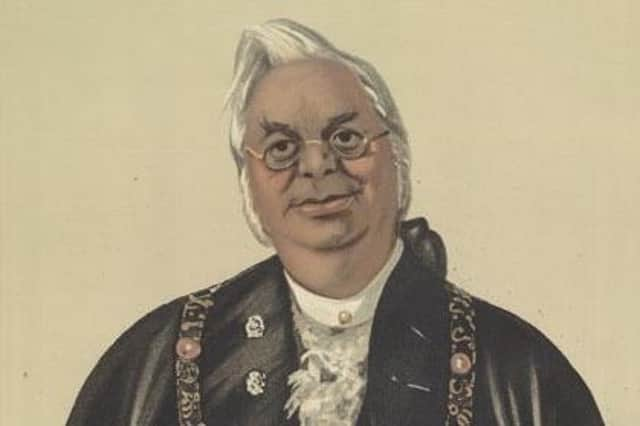The Methodist McArthur brothers, William and Alexander, excelled in both business and politics


Alexander McArthur was born on March 10 1814 at Enniskillen, Co Fermanagh, and was the son of the Rev John McArthur, a Wesleyan minister, and his wife Sarah (née Finlay). Educated privately, he was apprenticed in 1830 to a merchant in Omagh. On account of his poor health he emigrated to Sydney and arrived on January 24 1842. The Australian climate transformed his health.
He collaborated with his brother William in an export business based in Sydney, which proved so successful (particularly after the 1851 gold rush) that they entered into partnership and opened branches in Adelaide, Melbourne, Brisbane and Auckland (in New Zealand), as well as an office in London.
Advertisement
Hide AdAdvertisement
Hide AdIn August 1853 he married Maria Bowden, the daughter of a leading Wesleyan minister. They had six sons and two daughters.
McArthur pursued political careers in both Australia and the UK. In June 1859 McArthur was elected for Newtown to the Legislative Assembly of New South Wales as a free trader and an opponent of state aid to religion.
On October 11 he moved the acceptance of the native chief's offer to cede Fiji to the Crown. Re-elected in December 1860, he resigned in June 1861 when nominated to the Legislative Council. He vacated his seat through absence in October 1865.
In the UK between 1874 and 1892 he was a radical (or advanced) Liberal MP for Leicester and an advocate for the annexation of Fiji, of stricter Sabbath observance and of Home Rule for Ireland. Apart from his perhaps curious support for Home Rule, his political philosophy corresponded fairly closely to that of Joseph Chamberlain (‘Radical Joe’). He was a magistrate for Surrey, a deputy-lieutenant for the city of London and a fellow of the Imperial Institute and from 1863 the Royal Geographical Society, and member of the Royal Colonial Institute in 1869, the Victoria Institute and the British Association.
Advertisement
Hide AdAdvertisement
Hide AdHe also enjoyed business success in England, becoming a director of several building societies, insurance companies and mining companies.
Active in Methodism, in 1843 he was elected to the committee of the Wesleyan Auxiliary Missionary Society of New South Wales. His Christian witness and activism was not confined to his own denomination. For example, he was foundation treasurer of the Young Men's Christian Association of Sydney and a committee member of the Benevolent Asylum, the New South Wales Auxiliary Bible Society and a wide range of other charities.
In 1888 McArthur financed the building of Enniskillen Methodist Church’s impressive church hall which is still in use. McArthur died (at the age of 95) on August 1 1909 at Sydenham, London, and is buried in a large mausoleum in West Norwood Cemetery.
Sir William McArthur, Alexander’s older brother, was born on July 6 1809 in Malin in Co Donegal
Advertisement
Hide AdAdvertisement
Hide AdHe too was a very successful businessman, pursued a political career, also becoming a Liberal MP, and was a generous benefactor of Methodist College in Belfast.
In 1821 he was apprenticed to a woollen draper in Enniskillen. Moving to Lurgan in 1825, he established himself as a merchant in the town. Six years later he set up a drapery business in Londonderry, initially in partnership but later on his own account.
As already noted, he and brother created a very successful trading empire in Australia.
Success emboldened William to move from Londonderry to London in 1857 where he became chairman of the Star Assurance Company, and was a director of the City Bank, the Bank of Australasia and the Australian Telegraph Co.
Advertisement
Hide AdAdvertisement
Hide AdIn Londonderry he had served as an alderman. He became an alderman in London in 1872 and Lord Mayor of London in 1880. The following year he was one of the founders of the London Chamber of Commerce.
He made an unsuccessful bid to become an MP at Pontefract in the general election of 1865. However, at the general election of 1868 he secured election as MP for Lambeth. He retained the seat until its abolition in 1885.
In the general election of that year he unsuccessfully contested Newington West as an independent Liberal. He polled poorly but polled sufficiently to spilt the Liberal vote and enable the election of the Conservative candidate in a natural Liberal constituency. Although not as successful a politician as his brother, William was knighted but this was attributable to his term as Lord Mayor of London.
As a philanthropist, he was involved – along with Robinson Scot and Robert Wallace – in raising the money to establish Methodist College in Belfast in 1865. Originally the school was founded specifically for the education of sons of Methodist ministers (on the model of the Kingswood School in Bath).
Advertisement
Hide AdAdvertisement
Hide AdWhen McArthur died in November 1887, he made generous provision for the building of the College’s girls boarding hall. While day classes had been provided for girls in the early years, there had been no provision for the daughters of ministers to board.
William McArthur’s other philanthropic ventures included supporting the erection of new Methodist churches (through the Metropolitan Chapel Building Fund), overseas missions (especially in the south Pacific), the Orphan Working School of Haverstock Hill and Hornsey Rise, the Aborigines’ Protection Society, and Centenary Hall, Cottington Street, Kennington. Built as a Sunday School venue, Centenary Hall was opened in 1880. The centenary it commemorated was the opening of the first Sunday School by Robert Raikes and Thomas Stock in Gloucester in 1780.
Although both Alexander and William McArthur spent much of their lives outside Ireland, they never forgot their Irish Methodist roots.
William Alexander McArthur, one of Alexander McArthur’s sons, served as Liberal MP for St Austell from 1887 to 1908 and briefly as a Junior Lord of the Treasury in the Liberal administrations of Gladstone and Rosebery. His business career closely resembled that of his father.